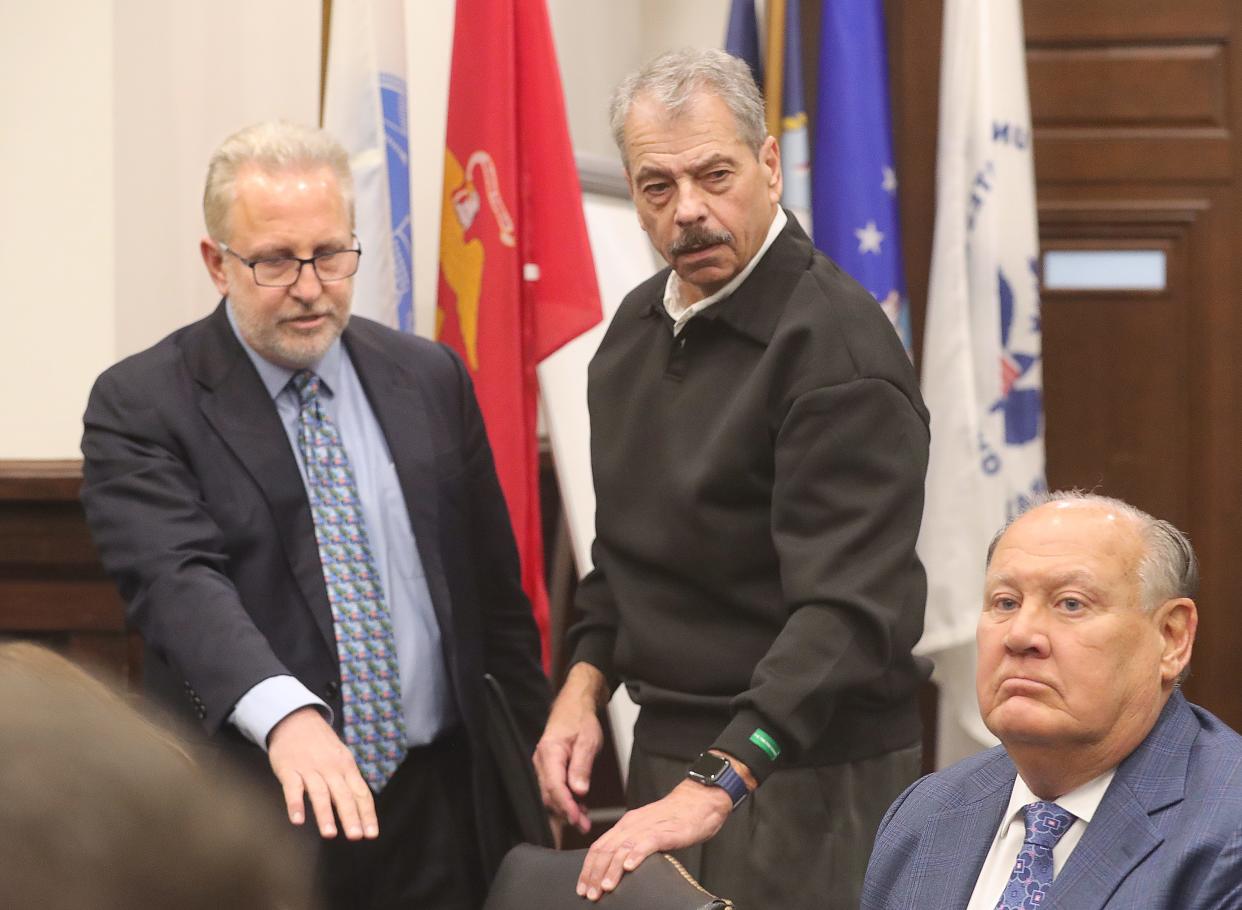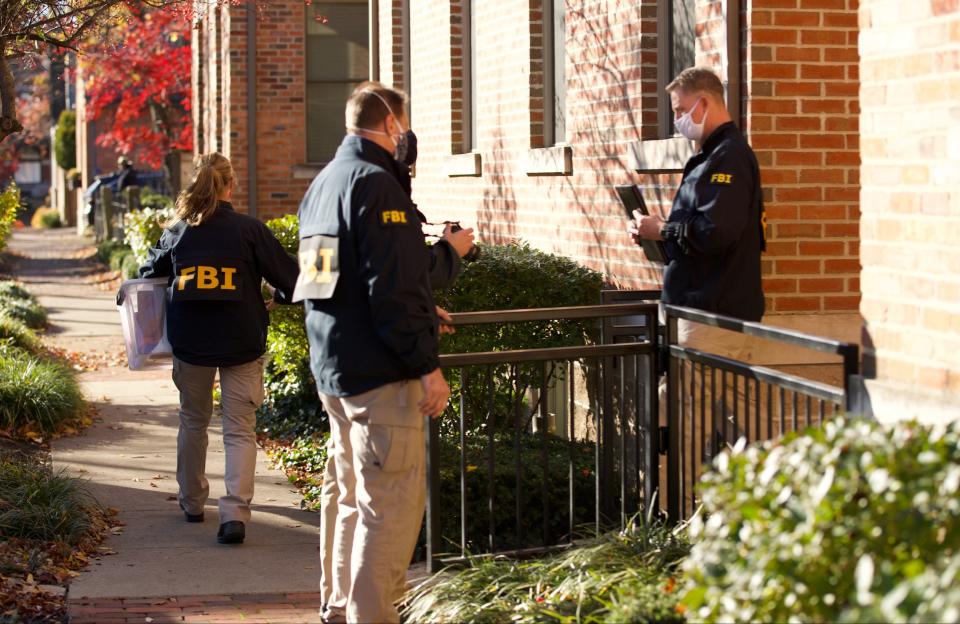The art of the side deal: How large energy users get refunds that average Ohioans don't

- Oops!Something went wrong.Please try again later.
Most Ohioans can't broker secret deals with their electric companies for lower bills.
But Ohio allows heavy-hitters to cut multimillion-dollar side arrangements with utilities.
These controversial deals were on full display in the recent indictment of Sam Randazzo, Gov. Mike DeWine's former top utility regulator.
Randazzo would broker agreements between utilities, such as Akron-based FirstEnergy or Columbus-based American Electric Power, and his large industrial clients. The utility would pay millions in rebates or other payments, and Randazzo's clients would drop their opposition to rate increases in front of the Public Utilities Commission of Ohio.
These deals are legal, as long as they are disclosed. But side arrangements have long been criticized as a pay-to-play system that allows electric utilities to buy off large energy users to the detriment of less connected businesses and consumers.
"Your first question should be: Who is not in the room, because you know they got screwed," said Ashley Brown, a former Public Utilities Commission of Ohio member.
Randazzo's penchant for controversial side deals was one of the warnings included in a 198-page dossier delivered to DeWine's chief of staff shortly before Randazzo was picked to lead the Public Utilities Commission of Ohio after DeWine took office in 2019. DeWine picked Randazzo anyway, a move the governor now concedes was a "mistake."
On Feb. 9, Randazzo and former FirstEnergy executives Chuck Jones and Michael Dowling were indicted on state charges, including engaging in a pattern of corrupt activity. All three pleaded not guilty to the charges against them.
Stay informed: Our Scoop newsletter, and Ohio Politics Explained podcast have the latest news you need
What is the history of side deals?
For years, these deals operated almost entirely in the shadows. A group would suddenly be on board with a rate increase, and everyone else would be left to wonder why.
But the Ohio Supreme Court shined some light on side deals in 2006 when it ruled how they could be disclosed to determine if all parties were engaged in serious bargaining − not some predetermined outcome. Randazzo opposed the decision at the time, saying side deals were irrelevant.
In 2008, then-Gov. Ted Strickland tried to eliminate side deals as part of a larger energy overhaul. But the changes didn't survive negotiations with then-House Speaker Jon Husted, Strickland's energy adviser Mark Shanahan said. Shanahan described Husted, now the lieutenant governor, as pro-utility and "particularly friendly with FirstEnergy."
Around that time, Cincinnati-based Duke Energy made headlines when a whistle-blower complained about side deals with large energy users. One of those side arrangements included a $100,000 payment to Randazzo's Industrial Energy Users-Ohio for "legal services" even though IEU-Ohio provided none.
Duke ultimately paid $80 million to customers to end a long legal fight in federal court. The company maintained its actions were legal, and that all customers were treated fairly.

How Randazzo brokered side deals, skimmed from clients
Under Ohio law, utilities must disclose side deals if they receive an appropriate request to do so. The Ohio Consumers' Counsel, which represents residential customers, routinely makes these requests to unearth side arrangements.
Companies that don't disclose their deals face a fine of $10,000 per violation per day. But that penalty has never been imposed.
The indictment accuses Randazzo of concealing a side deal between FirstEnergy and his Industrial Energy Users-Ohio, a trade group of large companies, such as TimkenSteel, the University of Akron, Marathon Petroleum and Abbott Nutrition, according to a 2015 list of members.
At the time, Randazzo was working for both FirstEnergy and IEU-Ohio, but Randazzo's industrial energy users didn't know it. Prosecutors allege Randazzo skimmed millions from that side deal while keeping his clients in the dark about the total sum of the arrangement and how much other members were getting.
Between 2016 and 2019, FirstEnergy paid Randazzo's shell companies nearly $13.2 million and Randazzo kept almost $5.4 million for himself, according to the indictment.
The murky nature of side deals allowed Randazzo to operate in secrecy. "The lack of transparency enabled Mr. Randazzo to steal from his clients with little chance of being caught," Deputy Attorney General Carol O'Brien said Monday.
In a different side deal with American Electric Power in 2016, Randazzo is accused of stealing $1.2 million from his IEU-Ohio clients. Randazzo listed one of his shell companies as one of IEU-Ohio's members and pocketed 12% of the side arrangement.
That deal was part of an arrangement that allowed AEP to charge customers for two coal plants, one of which is located in Indiana. In this case, the side deal was disclosed, and Columbus Business First reported on it.
IEU-Ohio adopted a new name last March: the Ohio Energy Leadership Council or OELC. An attorney declined to comment on side deals, saying in a statement that "OELC is a victim. OELC proactively approached law enforcement, offering our full cooperation and we will continue to cooperate in their pursuit of justice."
What is the future of side deals?
The main problem with side deals is they create an uneven playing field, Shanahan said. Large industrial users get rebates or cash payments that the average Ohioan doesn't. And once again, the utilities are holding most of the cards.
Ohio Consumers’ Counsel Maureen Willis said the PUCO's settlement process needs reforms because it encourages side dealing and cash payments to parties. The consumers' counsel is also for pushing for changes to how commissioners are selected.
“With the recent criminal indictments of former PUCO Chair Randazzo and former FirstEnergy executives, we are reminded of the oversized influence utilities have over state government," Willis said. "Side deals between FirstEnergy and the former PUCO chair are just one part of the problem."
The PUCO announced in December 2021 that it would investigate Randazzo's undisclosed side deal with FirstEnergy. But that probe, along with several others, is on hold at the request of the federal prosecutor investigating the pay-to-play scandal.
Meanwhile, FirstEnergy is asking for another increase in customers' bills. The company has objected to the Ohio Consumers' Counsel's recent request to disclose side deals, saying it has none.
That raised red flags for the consumers' counsel: "The fact that it is allegedly burdensome is telling and leads one to believe there could be many, many side deals with the parties."
FirstEnergy spokeswoman Jennifer Young said the company is "committed to pursuing an open dialogue as we work to reach constructive regulatory proceeding outcomes that benefit our customers."
"We believe in conducting holistic, transparent discussions with all interested stakeholders, listening to different perspectives and negotiating with all parties at the table," she added.
A PUCO attorney examiner, who acts like a judge in utility cases, later ruled that the consumers' counsel could review FirstEnergy's contracts with other parties at the company's headquarters in Akron. They could set up a date to see if there were side deals.
USA TODAY Network Ohio Bureau reporter Laura A. Bischoff contributed to this article.
Jessie Balmert is a reporter for the USA TODAY Network Ohio Bureau, which serves the Columbus Dispatch, Cincinnati Enquirer, Akron Beacon Journal and 18 other affiliated news organizations across Ohio.
This article originally appeared on Cincinnati Enquirer: Side deals: How large energy users get refunds that most Ohioans don't

